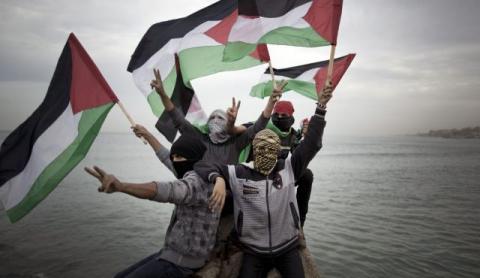Hundreds of Palestinian protesters set sail from Gaza on Monday in protest of the ongoing Israeli naval blockade that prevents fishing, trade, and freedom of movement for Palestinians living inside the resource-strapped territory.
Protesters say the blockade—which restricts Gazans from traveling more than six miles from shore—stifles the local fishing industry and adds to the food crisis and resource shortage in Gaza which stems from the Israeli-imposed blockade and militarization of Gaza's borders.
The protesters were demonstrating "to put pressure on Israel to stop its violation against the fishermen" and "against the illegal blockade and against the illegal occupation," Majed Abusalama, spokesman for the protest organizing Gaza-based Intifada Youth Coalition told The Jerusalem Post.
The group said 200 people took part in the "reverse flotilla" which set off from Gaza City where a portion of the boats crossed the six-mile maritime boarder, which is enforced by Israeli Defense Forces, before returning to shore.
" want to say to everyone that enough is enough," Abusalama said.
As Reuters reports, "Israeli forces have regularly shot at Gaza boats seen as trying to breach the blockade," although no reports of gunfire surfaced Monday.
"We have sent a message of solidarity with the fishermen and a message to the world that they must act to end the Gaza blockade," said Shorouq Mahmoud of the Intifada Youth Coalition.
Last month the Outgoing Commissioner General of United Nations Relief and Works Agency for Palestine Refugees in the Near East (UNRWA), Filippo Grandi, said Gaza has become "uninhabitable," due to the ongoing land and naval blockade which has vastly restricted access to food, water, building and medical supplies, and other basic necessities.
[This work is licensed under a Creative Commons Attribution-Share Alike 3.0 License.]


Spread the word